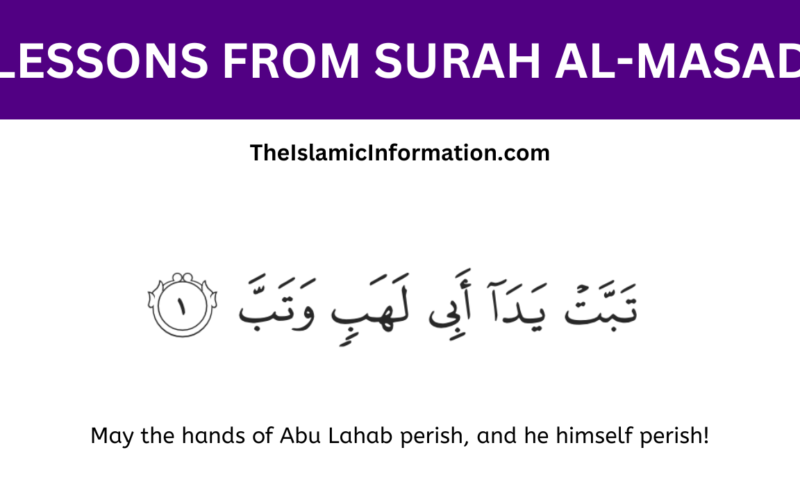This surah focuses on Abu Lahab, a fierce opponent of the Prophet Muhammad (peace be upon him).
Below are 10 lessons from Surah Al-Masad, with references to the verses for each.
1. Opposing the Truth Has Consequences (Verse 1)
“Perish the hands of Abu Lahab, and perish he!” (Al-Masad 111:1) highlights that those who oppose the message of Allah will face divine retribution.
Abu Lahab’s resistance to Islam serves as a cautionary tale, showing that opposing the truth will lead to ultimate failure.
2. Wealth and Status Cannot Save You (Verse 2)
“His wealth and his children will not benefit him.” (Al-Masad 111:2) teaches that material wealth and social status cannot protect someone from Allah’s judgment.
Abu Lahab’s worldly success could not save him from the punishment he faced for opposing the Prophet.
3. The Punishment for Rejecting the Truth (Verse 3)
“He will burn in a Fire of blazing flame.” (Al-Masad 111:3) refers to the punishment awaiting Abu Lahab.
It reminds us that rejecting Allah’s message and causing harm to others can lead to severe consequences in the Hereafter, including Hellfire.
4. The Role of Family in Spreading Harm (Verse 4)
“And his wife [as well]—the carrier of firewood,” (Al-Masad 111:4) reflects the role that Abu Lahab’s wife played in fueling hatred and opposition toward Islam.
It reminds us that family members who support wrongdoing will also be held accountable for their actions.
5. Evil Deeds Spread Like Fire (Verse 4)
The metaphor of Abu Lahab’s wife as the “carrier of firewood” suggests that evil actions can spread like fire, affecting others and escalating harm.
This lesson teaches us to be careful about engaging in negative behaviors that can lead to broader harm in society.
6. Slander and Harm Bring About Divine Wrath (Verse 4)
The involvement of Abu Lahab’s wife in slandering the Prophet emphasizes that spreading lies and causing harm to others will result in divine wrath.
This verse teaches that slander and insults can carry serious consequences, both in this life and the next.
7. No Power Can Defeat Allah’s Will (Verse 1)
The verse “Perish the hands of Abu Lahab” (Al-Masad 111:1) illustrates that no matter how powerful a person seems, they cannot oppose the will of Allah.
Abu Lahab’s attempts to harm the Prophet were futile in the face of divine justice.
8. Allah’s Justice Is Swift and Certain (Verse 3)
“He will burn in a Fire of blazing flame.” (Al-Masad 111:3) shows that Allah’s justice is not delayed.
Abu Lahab’s fate was certain due to his opposition to the truth, reminding us that those who spread harm will eventually face the consequences.
9. Accountability Is for All, Regardless of Status (Verse 4)
Even though Abu Lahab’s wife was of high social standing, she was not immune from divine punishment.
The verse “And his wife [as well]” (Al-Masad 111:4) teaches that every individual, regardless of their status, will be held accountable for their actions.
10. Actions Will Haunt You in the Hereafter (Verse 5)
“Around her neck is a rope of [twisted] fiber.” (Al-Masad 111:5) metaphorically represents the weight of sins that will follow a person into the afterlife.
This verse teaches us that the consequences of our actions will catch up with us, reminding us to live with integrity and righteousness.
Surah Al-Masad provides profound lessons about the consequences of opposing truth, the limitations of wealth and status, and the inevitability of Allah’s justice.
Through the story of Abu Lahab and his wife, this chapter serves as a reminder that everyone will be held accountable for their actions, and opposing the message of Allah will lead to dire consequences.


 WhatsApp Channel
WhatsApp Channel
 Instagram
Instagram
 Facebook
Facebook
 X (Twitter)
X (Twitter)
 Google News
Google News